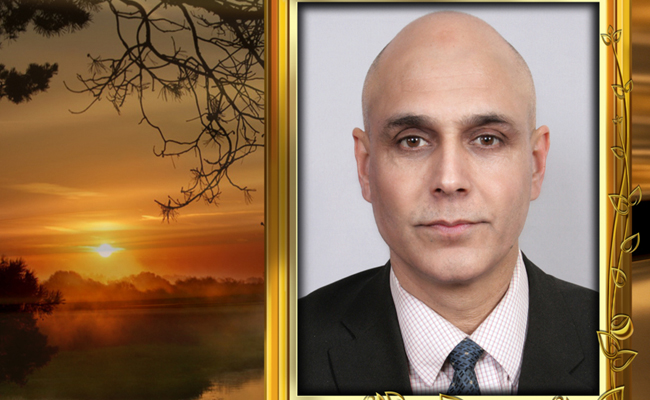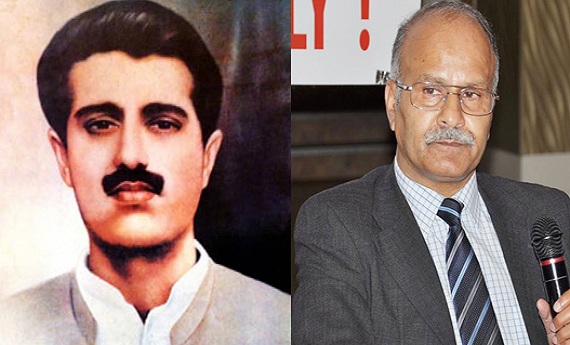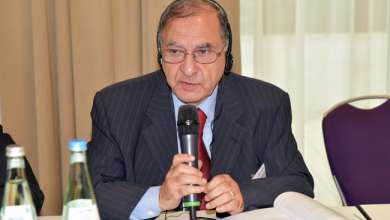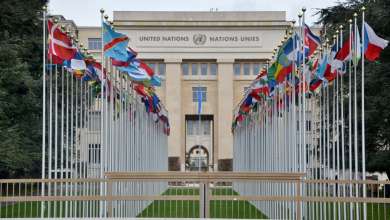Islamist Extremism versus Far-right Extremism

By Qasim Swati (United Kingdom)
Media has been dominated by certain terms or buzzwords during the last several decades, particularly after the September 11, 2001 attacks in Washington D.C. and New York City. Whenever we watch a TV, listen to a radio or other such programmes, read a newspaper, search on the internet or get involved in some political or religious discussion with someone, we have to see, hear and use such words, as extremism, radicalism, fundamentalism, radicalization, brain-washing, militancy, insurgency, rebels, Islamic, fanaticism, suicide bombing, suicide attacks and terrorism. So far, all such words have been more likely to be attributed to or linked with religious activities, especially the Muslim population, Muslim countries and Muslim organizations in the world.
However, the most discussed and spoken about word, these days, seems to be ‘terrorism’, but, bluntly speaking, terrorism is not a new word, because the terms ‘terrorism’ and ‘terrorist’ came into existence or originated during the French Revolution (a period of deep and far-reaching political and social upheaval in France and its colonies starting in 1789) of the late 18th century. [Stevenson, ed. by Angus (2010). Oxford dictionary of English (3rd ed.). New York: Oxford University Press].
Even the word ‘terrorism’ takes its roots from as back as 105 BCE (Before Common Era), because the combined term ‘terror cimbricus’ was interpreted or translated as a ‘state or condition of emergency and panic’ in Rome, as a result of the advance, approach or arrival of the warriors or fighters of the Cimbri tribe (an ancient tribe, commonly believed to be a Germanic tribe, emerging or beginning to exist in Jutland (a big or large peninsula, cape or promontory containing the mainland areas or regions of Denmark). Thus, the term ‘terrorism’ has been taken from a Latin word, which means ‘to frighten’, with a long historical background behind.
Nevertheless, the term ‘terrorism’ became generally popular during the 1970s, because there used to be news and reports in the media and books, in association with such conflicts and troubles, as in Northern Ireland, Palestine and the Basque Country (an autonomous community in northern Spain, including the Basque provinces of Gipuzkoa, Biscay and Alava. But the popularity of terrorism-related words and terminologies were fuelled by the occurrences of suicide attacks from 1980s onward and accelerated by the September 11, 2001 attacks in New York City and Washington D. C.
Terrorism is defined as the unlawful use of violence and intimidation, especially against civilians, in the pursuit of political aims. ‘Terrorism, in Title 22 Chapter 38 U.S. Code 2656f, is defined, as ‘premeditated, politically motivated violence, perpetrated against non-combatant targets by sub-national groups or clandestine (kept secret or done secretively, especially because illicit) agents.’ (“22 U.S. Code 2656f- Annual country reports on terrorism.” LII/Legal Information Institute. Retrieved, 2019 – 03 – 10).
There is a huge list, designated as foreign terrorist organizations, by the US State Department, but some of the most talked, discussed and written about of such groups include Al-Qaeda/al-Qaida (founded by Osama bin Mohammed bin Awad bin Laden, Abdullah Azzam (also known as Father of Global Jihad) and a Palestinian Sunni Islamic theologian and scholar) and some other Arab volunteers during the Soviet invasion of Afghanistan, founded in 1988; Ansar-ul-Islam (a militant Islamist group, active in Mali and Burkina Faso; Boko Haram (founded by a Nigerian Muslim leader, Mohammed Yusuf, in 2002, is a jihadist group or organization, based in north-eastern Nigeria, but also being active in northern Cameroon, Niger and Chad and is also referred to or known as, the Islamic State’s West Africa Province or the Islamic State in West Africa; ISIL/ISIS/IS (originated as Jama’at al – Tawhid wal – Jihad in Jordan in 1999, ISIL (the Islamic State of Iraq and the Levant) or ISIS (the Islamic State of Iraq and Syria/the Islamic State of Iraq and al – Sham) or officially known as IS (the Islamic State), is a Salafi jihadist militant group which became well-known globally in the beginning of 2014 because of its involvement in the ongoing Syrian Civil War, and also known as Daesh; Jemaah Islamiyah (meaning “Islamic Congregation”, formally established on January 1, 1993, by Abu Bakar Bashir and Abdullah Sungkar as its leaders, Jemaah Islamiyah is a South-east Asian militant Islamist rebel group, with its extreme ideas, operating in such parts of the world, as Singapore, Philippines, Malaysia, Indonesia, East Timor and Brunei; The Taliban/Taliban or Taleban, emerged as an influential and well-known faction in 1994 during the Civil War in Afghanistan, the Taliban are a Sunni Islamic military organization and political movement, with fundamentalist views and ideologies, talked about a lot in every corner of the world these days; Al – Shabaab/Harakat al-Shabaab al-Mujahideen (HSM), meaning ‘Youth Movement’, ‘Movement of Striving Youth, The Youth or The Youngsters, but commonly known as al-Shabaab, being described as a jihadist fundamentalist group, based in East Africa, and been active since 2006 till present, with its activities and operations in Yemen, Mozambique, Tanzania, Kenya and Somalia.
Far-right Extremism: Far-right politics is referred to such terms, as Nazism, neo-Nazism, fascism, neo-fascism, chauvinism, ultra-nationalism, anti-communism, racism, xenophobia, being reactionary, being rightist, elitism, fanaticism, jingoism, opposition to immigration and nativism, etc. Far-right extremism advocates, spreads and applies nativist ideologies, authoritarian tendencies and hard-line nationalism in the world.
Nazism: This is the collection of the political principles of the National Socialist German Workers’ Party or extreme racist or authoritarian views or behaviour. It was because of Nazism that Nazi Germany, led by Adolf Hitler, perpetrated the Holocaust (also known as the Sho’ah), resulted in the genocide of around six million innocent European Jews, during World War II between 1941 and 1945.
Neo-Nazism: It is a modern extreme right-wing political movement and ideology, based on a resurgence of support for Nazi ideological principles, programmes and policies, adopted by Hitler and his Nazi Party’s supporters.
Fascism: Fascism is a governmental system, led by a dictator, having complete power, forcibly suppressing opposition and criticism, regimenting all industry, commerce, etc., and emphasizing an aggressive nationalism and often racism. It is, in other words, a political movement that employs the principles and methods of fascism, especially the one established by Mussolini in Italy from 1922 to 1943. (Dictionary.com).
Neo-fascism: A modern right-wing political movement that includes significant elements of fascism, especially inspired by fascist Italy, is known as neo-fascism.
Chauvinism: It means exaggerated or aggressive patriotism or excessive or prejudiced support of one’s own cause, group, or sex.
Ultra-nationalism: Extreme nationalism that promotes the interests of one state or people above all others is called ultra-nationalism.
Racism: This is prejudice, discrimination, or antagonism directed against someone of a different race based on the belief that one’s own race is superior to others.
Xenophobia: This is a dislike of or prejudice against people from other countries. Xenophobia is similar to nativism which is the policy of protecting the interests of native-born or established inhabitants against those of immigrants. Nativism is also the political idea that people who were born in a country are more important than immigrants (= people who have come to live in the country from somewhere else).
Elitism: This is a belief that a society or system should be led by an elite (the richest, most powerful, best-educated, or best-trained group in a society). Similarly, being rightist is someone who supports the political views or policies of the right.
As already mentioned that different forms of Islamist extremism have always dominated the media, whether this is the radio or TV, the internet or press or any other platform of information in the past, but recently, there is a slight shift in debating and discussing various forms of far-right extremism, like white supremacy or white supremacism in the media due to certain events of terrorism in the world. For instance, the two consequent terrorist attacks at two mosques in Christchurch, New Zealand, during Friday Prayers on March 15, 2019, drew the attention of the media to the deteriorating far-right views against immigrants, non-Christian and non-white people. This was a terrorist attack in the form of mass shooting, by using two semi-automatic rifles, two shotguns, undetonated car bombs and one lever-action rifle, by a 28-year-old Australian citizen (Brenton Tarrant), motivated by white supremacy, Islamophobia and far-right extremism, which left 50 people dead and 50 more injured.
White Supremacy or White Supremacism is the racist attitude or belief that non-white people of other races are inferior to white people, and that white people, thus, should have power and influence over others. There are many examples of terrorist activities and acts, resulted from following far-right ambitions and desires in various parts of the globe, but only some of such events and occurrences are, briefly, mentioned, as follows:
United States Holocaust Memorial Museum Shooting: It was on June 10, 2009 that an 88-year-old James Wenneker von Brunn (a white supremacist and Holocaust denier) entered the United States Holocaust Memorial Museum in Washington D.C. and shot dead the Museum Special Police Officer/Security Guard, Stephen Tyrone Johns, with a rifle and injured another. (Wilgoren, Debbi; Branigin, William (2009 – 06 – 10). “2 People Shot at U.S. Holocaust Museum.” The Washington Post. Retrieved 2009-06-10).
Such far-right terrorist attacks are not carried out only against Muslims and Jews, but the victims of such attacks can be members of any faith. Thus, it was a 40-year-old Wade Michael Page (a white supremacist, neo-Nazi white power skinhead, nationalist American and Army veteran from Cudahy, Wisconsin, who shot dead six members of the Sikh faith and injured four more during a mass shooting at the gurdwara (a Sikh temple or place of worship, meaning ‘door to the guru’) in Oak Creek, Wisconsin, USA, on August 5, 2012. (“Sources name alleged gunman in Wisconsin temple shooting.” CNN, August 6, 2012).
Similarly, on April 13, 2014, it was a 73-year-old gunman, named Frazier Glenn Miller Jr., of Aurora, Missouri, a neo-Nazi, ex-political candidate and Klansman (a member of the Ku Klux Klan/KKK, an American white supremacist hate group), who perpetrated and carried out two shootings at Village Shalom (a Jewish retirement community) and the Jewish Community Centre of Greater Kansas City, both situated in Overland Park, Kansas, USA, and killed three people. (“Kansas Jewish Centre Shooting Suspect Identified as Former KKK Leader – ABC News”. ABC News. 2014-04-13. Retrieved 2014-04-23).
Another mass shooting took place on October 27, 2018, at the Pittsburgh Synagogue (Tree of Life – Or L’Simcha Congregation/a Conservative Jewish synagogue in the Squirrel Hill neighbourhood of Pittsburgh, Pennsylvania), during Shabbat morning services, that left eleven people dead and seven wounded. This time, the killer and attacker was a 46-year-old anti-Semite, Robert Gregory Bowers. The attack was considered the deadliest one in the US on the Jewish community. (Selk, Avi; Craig, Tim; Boburg, Shawn; Ba Tran, Andrew (October 28, 2018). “’They showed his photo, and my stomach just dropped’: Neighbours recall synagogue massacre suspect as a loner.” The Washington Post. Retrieved October 30, 2018).
Likewise, Chris Hani (1942 – 1993) was the leader of the South African Communist Party and a strong opponent of the apartheid (in South Africa, a policy or system of segregation or discrimination on grounds of race) government in South Africa, who was killed on 10 April, 1993, by a Polish-born far-right anti-communist, Janusz Walus, helped by another far-right pro-Apartheid MP (Clive John Derby – Lewis) by providing the murderer with the gun.
In the same way, it was on June 19, 2017, that Finsbury Park Mosque vehicle-ramming attack took place where one person died and twelve others were injured. The attack had been carried out by Darren Osborne of Cardiff who had been radicalized as a result of reading far-right material/literature online. [(Dodd, Vikram; Rawlinson, Kevin (2018-02-01). “Finsbury Park attack: man ‘brainwashed by anti-Muslim propaganda’ convicted.” The Guardian. ISSN 0261 – 3077. Retrieved 2019 – 02 – 24].
Anyway, whether this is Islamist extremism, far-right fanaticism or any other sort of such evil acts, deeds and wrong-doings, should be thoroughly discouraged, eliminated and eradicated with the help of taking all possible steps, measures, initiatives and actions, by teaching, encouraging and applying tolerance and non-violence in every community and society of the world.
Qasim Swati is a freelance journalist, writer and human rights activist, based in the UK, and can be reached at: https://qasimswati.com/ or qasimswati2003@yahoo.co.uk





